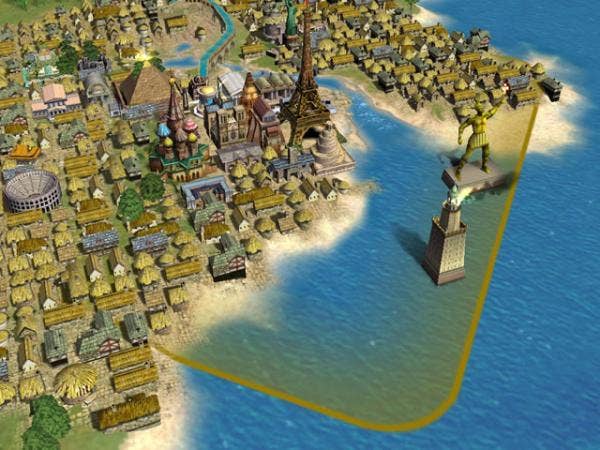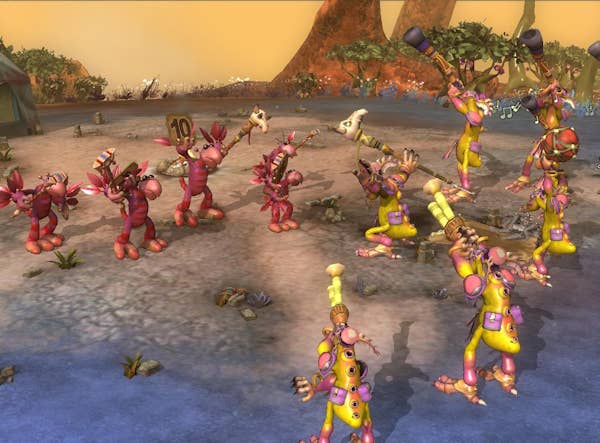Soren Johnson: Why I Left EA for Zynga
The Civ and Spore designer reveals the news to us and hints at his surprising next project in this exclusive interview
Soren Johnson is one of the leading game designers of the last dozen years. Having worked on huge franchises like Civilization and Spore, and with luminaries like Sid Meier and Will Wright, Johnson has learned a thing or two about what makes a good game actually resonate with an audience. It's a good thing for Zynga then that the company's gained his services. GamesIndustry International can exclusively reveal that Johnson was actually hired back in September 2011 as a Design Director and he's been stealthily working on his first project there ever since.
Johnson spent most of his career working at Firaxis Games. He was the lead designer on Civ IV, and then in 2007 he left the studio to join Electronic Arts to assist with the development of Will Wright's Spore. As you'll read in the full interview below, Johnson's experiences at both companies will play an important role in his approach to game design at Zynga. He also hints that his first game will truly be a "big departure" for Zynga.
Back in 2010, Tim Train, Zynga East general manager, invited me to lunch to catch up and chat about Zynga. I wasn't actively looking for opportunities, but I knew Tim - and Zynga's new Chief Game Designer Brian Reynolds - from my time at Firaxis in Maryland. In fact, I was originally hired in 2000 as part of the effort to rebuild the Civ3 team after Tim and Brian left to form Big Huge Games. Tim gave me an interesting perspective on some of the changes happening within Zynga - and some of the new opportunities available - so I started talking with them more seriously about joining the company and, more specifically, Zynga East.
I'll have to admit that before talking to Tim and Brian I had not considered working at Zynga or at any of the other companies focused solely on social gaming. I have a huge amount of respect for the work Tim and Brian have done together - from Microprose (Colonization, Civ3) to Firaxis (Alpha Centauri) to Big Huge Games (Rise of Nations, Rise of Legends). Brian is among just a handful of people who has both designed and programmed a version of Civilization, so I knew we would speak the same language. Having a high level of trust in my co-workers is very important to me, so that connection helped me take the leap of faith to join Zynga.
"The best-case scenario for social gaming is for the term itself to disappear as all games become more social, even ones that are traditionally thought of as primarily single-player"
Soren Johnson
As for the social game space in general, I'm excited because the model is a departure from the traditional gaming concept of forcing the player to buy a $60 boxed copy of the game, often with no ongoing relationship with him or her after the game is finished. Social games are free-to-play, available to anyone with a browser, and always connected. This combination unlocks many possibilities that were impossible under the old model. Social gaming has provoked a lot of criticism in the industry, and I was concerned about the role game designers played in the development process as I believe games rise or fall based on the vision of the people driving the design. Many designers are openly worried about whether social game design is being led by metrics towards decisions which maximize revenue over fun. Tim and Brian, however, convinced me that Zynga is shifting its primary focus to game design.
Ultimately, I told Tim and Brian what type of game I wanted to make, and Zynga is now giving me the chance to make it. The greatest opportunities today are for games that connect players and avoid the traditional retail model of gaming. Zynga suddenly made sense for me when it became clear that they wanted to experiment with new types of games in this space.

The shift we're seeing with industry talent moving towards social and mobile games illustrates the challenges of the old model. That model demands selling a $60 box product, which requires exceptionally high production values to sway the consumer. Of course, AAA production means development costs measured in the tens (or perhaps hundreds) of millions of dollars, which then requires a game to sell at least several million copies at the $60 price to be worth developing. This business model can work, but the margins are not great, and they keep getting worse as development costs increase and retail sales soften. One of the bizarre paradoxes of this system is that some mid-tier games cost too little for traditional games companies to fund because the company needs to put all of its organizational weight behind a few key titles.
Mobile and social gaming suddenly became very attractive for game designers because they circumvent this problem entirely. As these games require a fraction of the cost of AAA games, radical new ideas can be tried out fairly easily and with little institutional pressure. Further, feedback is much easier to gather from the Web or connected smartphones, and teams can continually course-correct with regular updates. The old system of expensive, multi-year development, cut off from the oxygen of player feedback, suddenly became much less appealing.
Zynga East actually feels fairly similar to Firaxis, which is not surprising since they share some cultural DNA. Both studios focus on getting a prototype playable immediately and then iterating on the design as often as possible. The speed Zynga moves, however, is much, much faster than I have ever seen, which is simply a reflection of development on the Web. I am somewhat insulated as I'm on a smaller team. We've got ample time to develop our project, but we are still following Sid's traditional Firaxis model. Our game was playable within a couple months, we are running regular test sessions within the company, and our feature list is driven by feedback from these games.
Fun still happens inside the player's head, and that doesn't change from platform to platform. What does change is that certain design possibilities are unlocked with each new technology, such as zero account overhead, assumed persistence, guaranteed connectivity, pre-made friends lists, built-in viral channels, universal access, and ever-improving game engines. These features let us explore areas of design that were previously unavailable. Indeed I feel like my work right now is a direct continuation of what I have done in the past, and I am simply using my twelve years of experience as a strategy game developer to take advantage of these new possibilities.
I am doing the code and the design for the project, just as I did with Civ IV. I like working this way because I can spend less time explaining how I want a feature to function and more time watching how it works out in practice. I am using a somewhat unusual technology solution (GWT/PlayN) that enables me to write a HTML5 game in one language, including client and server, which means I have no duplicate, error-prone code and a very consistent style. Of course, doing code and design could make me a major bottleneck as the project grows larger, but one of the advantages of strategy games is that - because they are rules-driven instead of content-driven - a small amount of code can create a large amount of gameplay. Thus, extra engineering resources will be dedicated to features that work in parallel to the core game - scalability, UI, matchmaking, metrics, modding, and so on.
I'm afraid that it's too early to reveal much about what I'm currently working on, especially since a lot could change between now and our release date. However, I can say that I am working on a game that would not be a shocking departure from my development history, but one that is multiplayer-focused, free-to-play, persistent, and playable in the browser. Most importantly, the game is one that actually ends, with real winners and real losers. That's a big departure for Zynga, but it's a necessary element for many types of strategy games. Decisions matter in vastly different ways once games have an actual victory condition. Put another way, a bit of a level race does exist in persistent MMOs like World of Warcraft, but ultimately the race is just with yourself. No one else really cares how much time you put into your dwarf cleric. On the other hand, it's a powerful feeling when you beat someone to a wonder in Civ IV.
After a couple years the term "social gaming" came to mean different things to different people, and many traditional game developers simply use the term to describe "games on Facebook that we don't like." On the other hand, some of the biggest hits (Words with Friends, Bejeweled Blitz, Draw Something) are not really thought of primarily as "social games" but simply as great games that take advantage of the possibilities of social gaming - guaranteed connectivity, account persistence, meaningful friends lists, etc. Therefore, the best-case scenario for social gaming is for the term itself to disappear as all games become more social, even ones that are traditionally thought of as primarily single-player. For example, consider how friend-based leaderboards drive the experience in console games like Trials Evolution or Burnout Paradise.
Ultimately, gameplay is determined by the input and output of the devices we use, which enables and encourages certain types of play, and there are currently three important formats - the consoles (defined as gamepad, high-def TV, couch-based), the PC (keyboard, mouse, monitor, desk-based), and mobile (small screen, touch-based, omnipresent). Consoles will continue to dominate avatar-based games as controllers are built to "pilot" characters or vehicles. PCs are the natural home for more complex games because of their precise input and "lean-in" environment. Mobile is perfect for asynchronous gaming, and the touch-based user interface creates entirely new types of games just like the Wii did with motion-based controls. The best games will take advantage of the unique power of their formats, which is why we shouldn't necessarily expect Facebook games to suddenly become Halo.
What's interesting about the games business right now is that we have four different business models operating at once. For console games, retail still dominates with increasing revenues from microtransactions. On the PC side retail is dead, but traditional, single-purchase games still thrive on Steam. Furthermore, free-to-play games from CityVille to League of Legends can succeed purely via microtransactions. On mobile devices, the app store dominates with the big money coming from in-app purchases. Over time, these four models will almost certainly merge into one consistent system. We have already seen plenty of convergence; Steam made a big push to support microtransactions and free-to-play games while in-app purchases were an important later addition to Apple's App Store. The big question is the next generation of consoles. The benefits of fully embracing an app store model are obvious, but there are many entrenched interests and historical relationships slowing down that transition.
App stores, in general, are very interesting simply because they make it possible to actually charge players for small-scale games. For example, there is no reason why I shouldn't be able to buy Ascension for $4.99 to play in my browser, but the tradition simply does not exist to "buy" web pages. On the other hand, the Apple App Store combines frictionless purchasing, flexible pricing, automated submissions, and an enormous audience to create a market for games which didn't exist previously. At some point, the importance of the browser (with open standards and cross-device support) needs to combine with the ease of the app store (with a standardized purchasing model), to hopefully create an even better system.
"The world of social gaming is still largely unexplored and undeveloped. No game genre will be left untouched by the best innovations"
Soren Johnson
I loved the time I spent working with Sid and Will because they are both such unique people with rich histories. I wish someone would write a book on the two of them, not only because they are the colossi of early American video game design but also because they are an extreme contrast in style and personality. Will's projects and ambitions spiral higher and higher to dizzying heights while Sid still dives into the nuts-and-bolts of a project. Will's most important tool for making a game is his team; Sid's most important tool is Visual Studio. However, both of them are extremely player-focused and still think more about what is going on inside the player's head instead of what is happening on the screen. This insight will always be important, and every game company, Zynga included, would benefit from it.

I expect Civ fans will absolutely be interested in my current project at Zynga; in fact, I anticipate them to be among the first wave of players to try out the game. As with Civ IV, I will be trying to make the game as simple as possible to keep it accessible for any kind of player. Remember that Civ itself is no typical strategy game and has an audience which is an order of magnitude larger than any other turn-based strategy game. The reason is that the series is infused with "Sid's design parsimony" (to borrow a phrase from Chris Crawford), refusing to pile on more and more rules and mechanics in the name of realism. I hope to carry this tradition forward to make a game for every gamer.
I am. I love my iPad; within an hour of turning it on, I knew it was a device that would change my life and my career. I would be hesitant to reveal how many board games I've bought for it, including many which are already on my shelves. Strategy games - especially ones that can be played asynchronously - are a perfect fit for the iPad, and I feel that developers are just beginning to take advantage of this match.
To be honest, I'm not even sure how much it costs to build and maintain a contemporary social game. The inevitable path for every new game genre, format, or innovation is for rapid early growth due to novelty and a lack of competition followed by an escalating war of production values as different companies vie for slices of the same pie. Having said that, the world of social gaming is still largely unexplored and undeveloped. No game genre will be left untouched by the best innovations. Accordingly, it's important that companies spend some time trying to discover what new, as well as what old, games work online.
It's important for social games companies to look at more areas for innovation. In fact, Zynga just had an internal competition called "Game Pitch" in which anyone within the company could submit ideas for consideration. Ultimately, ten ideas were chosen and presented directly to all employees who wanted to judge the entries. It's too early to know if any of these ideas will turn into successful games, but the competition was at least a direct message that Zynga wants to expand its reach beyond the style of games it already dominates. My own game is a more targeted approach at trying to reach new audiences, but I think it's important for the social games industry to leave room for small, nimble projects that might someday become new tent poles.

